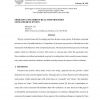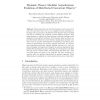311 search results - page 5 / 63 » DisCComp - A Formal Model for Distributed Concurrent Compone... |
ANSOFT
1999
13 years 7 months ago
1999
We give a formal framework for studying real-time discrete-event systems. It describes concurrent processes as sets of possible behaviors. Compositions of processes are processes ...
ACSD
2005
IEEE
14 years 28 days ago
2005
IEEE
This paper elaborates on the application of some aspects of robust systems control theory to the management of uncertainty and risk in distributed and complex design processes, ha...
FM
2009
Springer
14 years 1 months ago
2009
Springer
Abstract. Many long-lived and distributed systems must remain available yet evolve over time, due to, e.g., bugfixes, feature extensions, or changing user requirements. To facilit...
ACSD
2003
IEEE
14 years 18 days ago
2003
IEEE
This paper presents a synthesis approach for reactive systems that aims at minimizing the overhead introduced by the operating system and the interaction among the concurrent task...
PDPTA
2003
13 years 8 months ago
2003
In this paper, precedence constraint combination formalisms defined in the software domain are used to define the behavior of hardware systems. Specifically, AND-join and various ...


